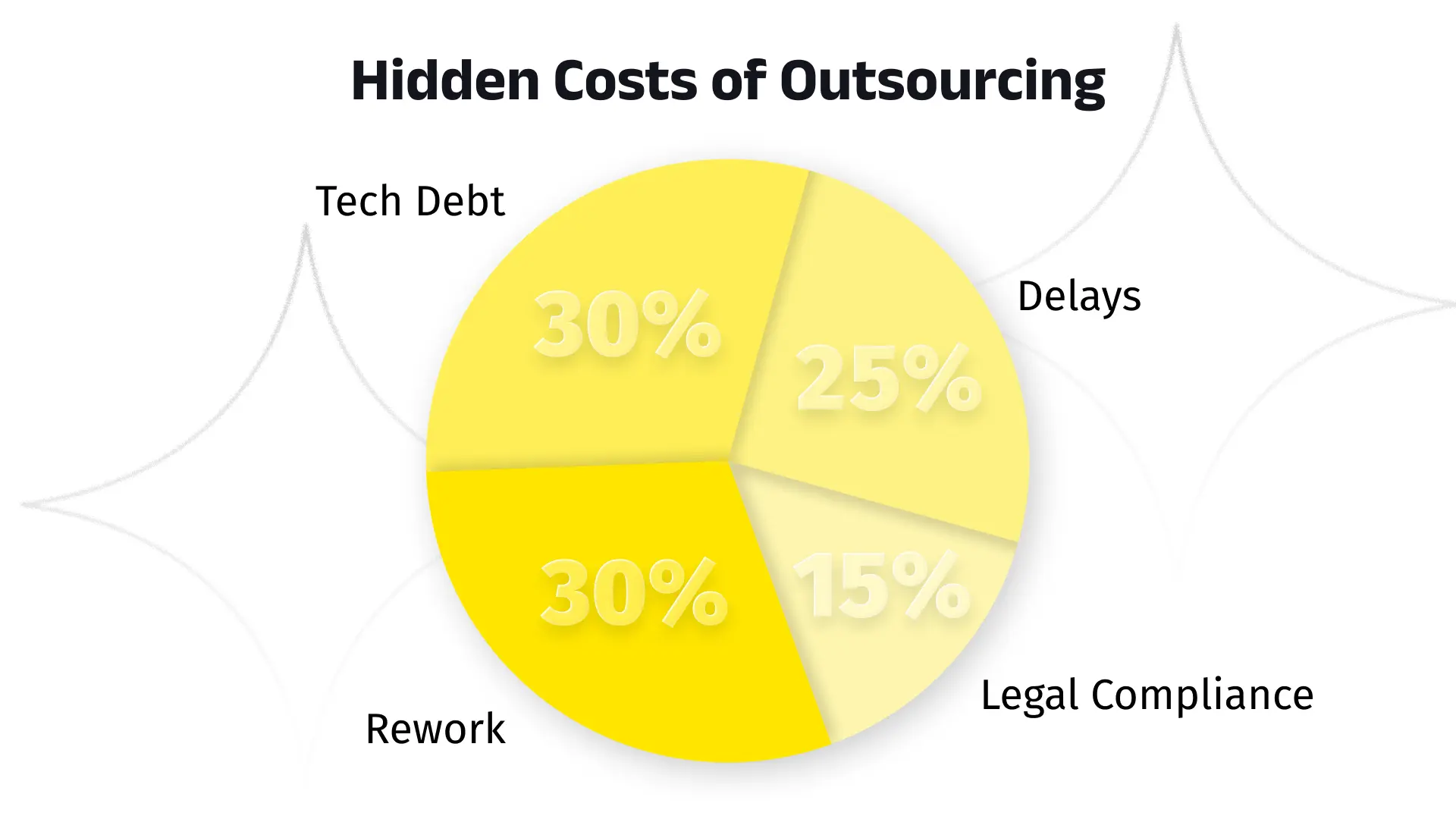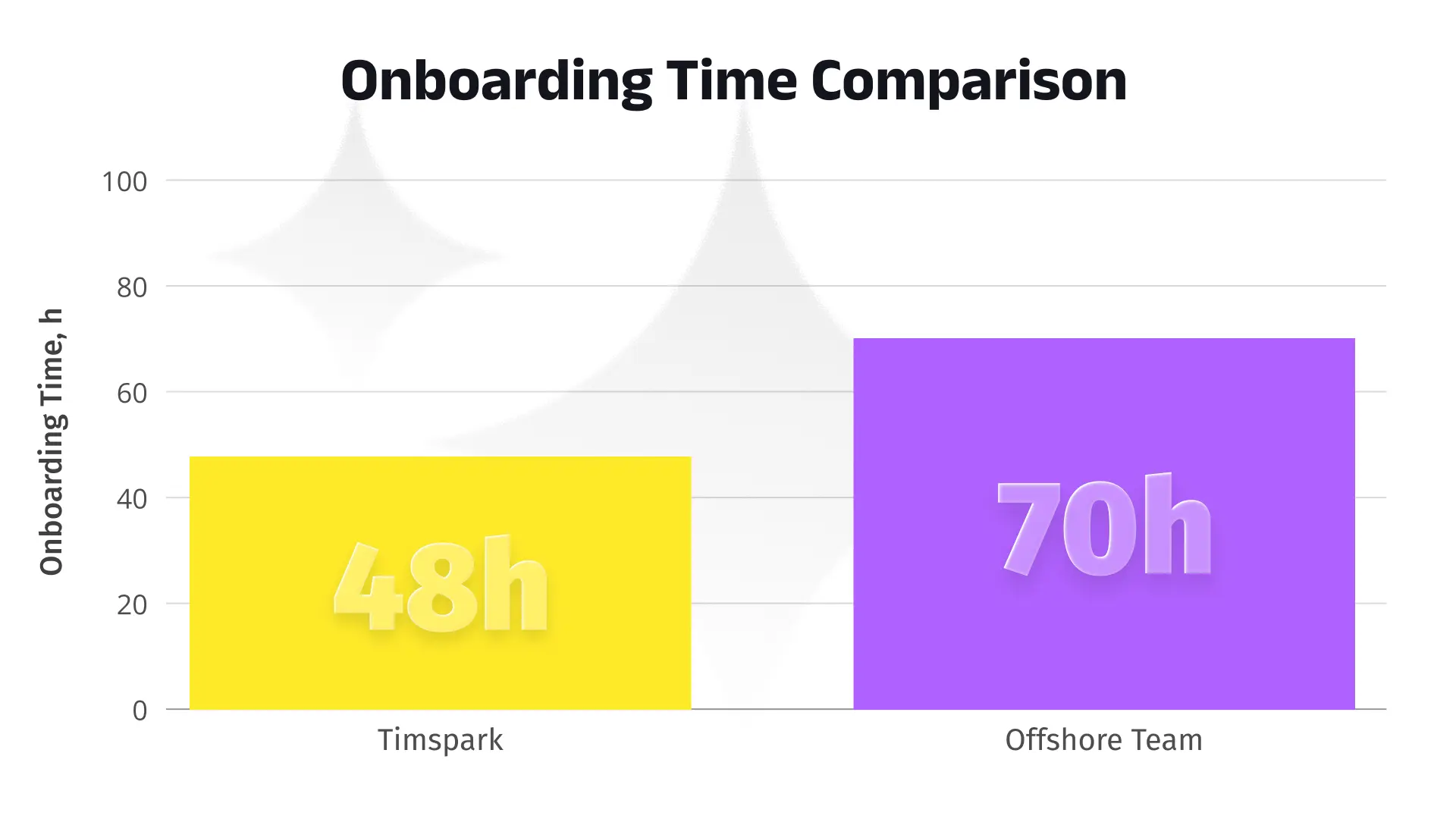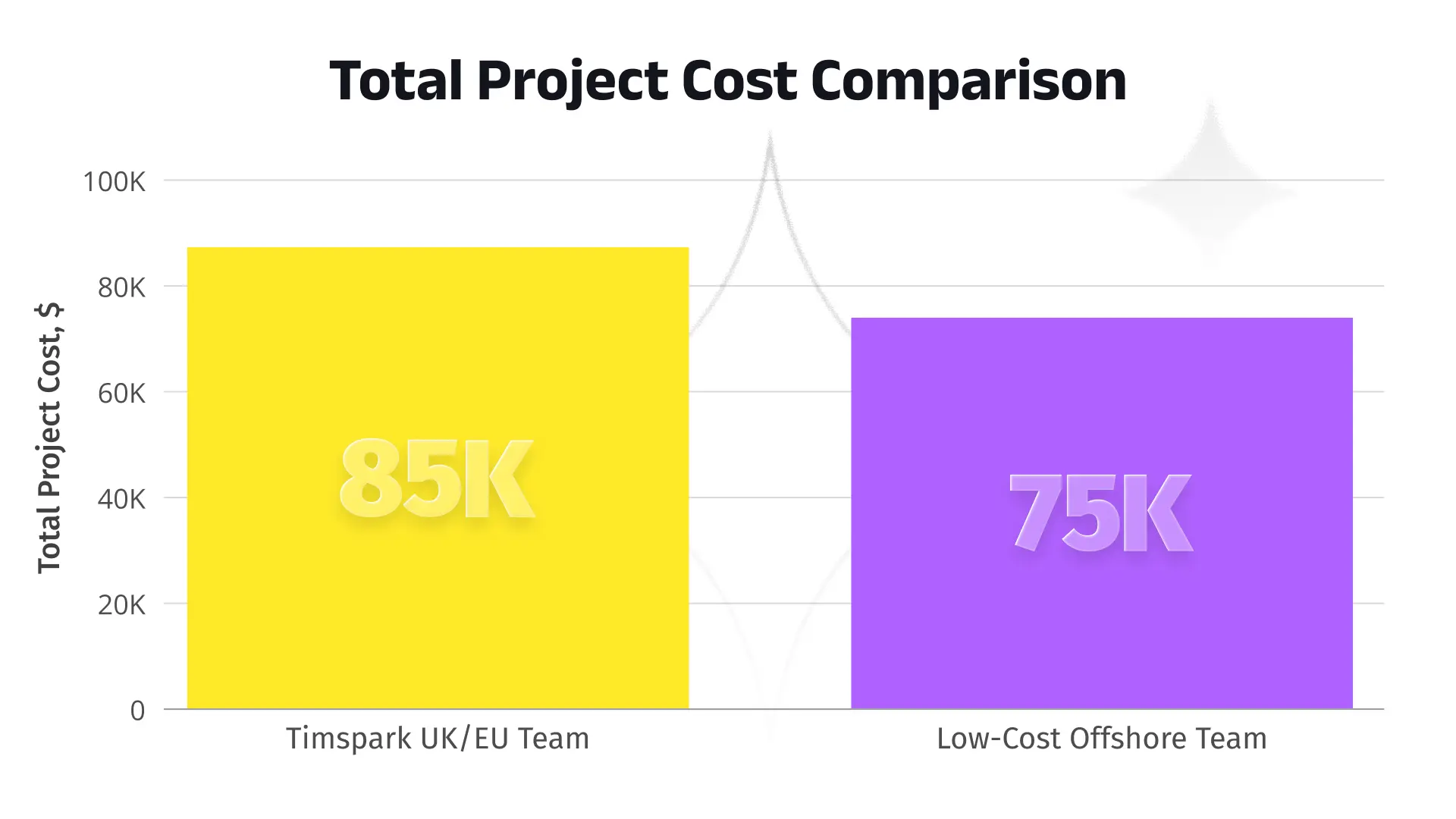Breaking the Myths: Why UK & EU-Based Developers are an Advantage for AI and Tech Projects
Alina Ramanenkava, Growth Marketing Manager
Last updated: July 30, 2025
Introduction: The Hidden Costs Behind “Affordable” Development
At Timspark, we regularly speak with companies seeking to scale their tech capabilities in rapidly growing fields such as AI, DataOps, automation, and digital transformation. Often, the conversation starts with one question: how much does it cost? And while cost is important, it’s rarely the whole story.
Markets like LATAM and parts of Southeast Asia advertise extremely competitive hourly rates — sometimes less than half of what you’d pay for UK- or EU-based developers. However, when building critical infrastructure or handling sensitive data, the true cost of development encompasses compliance, transparency, legal certainty, and risk exposure.
The reality? “Cheap” development often comes with hidden costs — some operational, some reputational, and some deeply legal.
From due diligence and IP protection to enforceability and regulatory exposure, working with partners who operate within the same legal and business frameworks is a significant long-term advantage — especially for businesses in the UK, EU, and North America.
1. Compliance Matters: Why Legal Clarity Should Be a Priority
One of the most overlooked aspects of outsourcing is verifying your counterparty. As companies face growing regulatory scrutiny — particularly in industries such as finance, healthcare, and enterprise AI — it’s no longer acceptable to work with anonymous or opaque vendors. That’s why KYC (Know Your Customer) and KYB (Know Your Business) processes are becoming standard not just for banks, but for any responsible B2B engagement.
“Due diligence isn’t optional — it’s a baseline requirement.”
In many lower-cost regions, basic verification becomes a real challenge. Public registries may be incomplete or offline, documentation may be in a local language, and legal systems may diverge significantly from common law or EU frameworks. In extreme cases, validating a company’s existence, structure, or beneficial ownership may require hiring local legal counsel — adding delay and cost to the onboarding process.
Why this matters:
- Legal opacity adds risk: Working with vendors from underregulated jurisdictions increases the burden of proof for compliance.
- FATF grey and blacklists highlight countries with strategic deficiencies in AML/CFT (anti-money laundering and counter-terrorism financing). Doing business with companies registered there triggers enhanced due diligence under international frameworks such as the EU’s 5th AML Directive and the UK’s Money Laundering Regulations.
- In some jurisdictions, religious or mixed legal systems introduce unfamiliar variables in contract enforcement, ownership rights, or IP law (source: Lexology).
Timspark’s approach to ensuring legal and operational transparency in the UK/EU.
At Timspark, we’re committed to transparency, accountability, and alignment with international standards. That means:
- Our contracts use clear and enforceable terms based on English or EU-aligned law;
- We support streamlined vendor onboarding through verified documentation and standard compliance packs (KYB, AML, etc.);
- We help clients avoid legal “blind spots” when building mission-critical AI or cloud systems.
We believe that a low hourly rate is meaningless if you’re paying for hidden risks. For companies that value governance, data security, and regulatory clarity, UK/EU-based development isn’t a premium — it’s a safeguard.
2. The Complexity of Global Due Diligence: It’s Not Just About Rates
Choosing an outsourcing partner isn’t just about price or tech stack — it’s about trust. And trust begins with knowing exactly who you’re working with, both legally and operationally. Unfortunately, in many “low-cost” regions, verifying a company’s legal standing, beneficial ownership, or actual business activity can be far from straightforward.
At Timspark, we’ve worked with clients who previously struggled to complete basic KYC or onboarding procedures with vendors based in countries where:
- Company registers were offline or incomplete;
- Legal documents were not publicly accessible, or were available only in local dialects;
- Beneficial ownership was obscured behind nominee directors or shell structures;
- Local laws deviated significantly from common law principles, making it difficult to assess liability or enforce contracts.
“ This becomes especially critical when a project involves IP-sensitive codebases, user data, or AI model ownership — areas where documentation, jurisdiction, and enforceability directly impact your long-term business risk.”
Due diligence costs can quickly add up.
To overcome these barriers, companies are often forced to:
- Hire a local legal counsel to verify registration and ownership;
- Translate and notarize documents;
- Assess exposure to FATF-listed risks and international sanctions (e.g., OFAC, EU, UN);
- Conduct enhanced due diligence if the vendor is based in a “non-cooperative jurisdiction.”
Each of these steps adds time, overhead, and legal exposure. What started as a “budget-friendly” outsourcing deal can quickly become more expensive than hiring a verified team in the UK or EU — and that’s before development even begins.
Compare that to UK/EU-based developers:
When working with UK-based companies, clients benefit from:
- Publicly accessible corporate registries;
- Contracts governed by English or EU-aligned law;
- GDPR compliance is baked into all data handling and infrastructure choices;
- Faster onboarding with standardized KYB packages (certificate of incorporation, director IDs, etc.);
- Clear understanding of IP assignment, data protection, liability, and dispute resolution.
In other words, due diligence isn’t an obstacle — it’s a frictionless step forward.
Key Takeaways for Risk-Conscious Buyers
- Don’t assume KYC is “just for finance.” In a post-GDPR, post-SVB, post-AI Act world, all serious tech buyers need to verify their partners.
- Legal infrastructure matters. If you can’t Google their company registry or read their terms of service, that’s a problem.
- Due diligence isn’t just a checkbox. It’s a critical part of reducing business risk, especially when outsourcing AI or handling personal data.
3. Why UK & EU-Based Developers Offer Real Business Safety
At Timspark, we don’t just sell development capacity — we deliver strategic peace of mind. For businesses operating in highly regulated, competitive, or innovation-driven environments, the question isn’t just “Can they build it?” but “Will it be legally safe, secure, and supportable long term?”
Choosing developers based in the UK and EU offers a built-in compliance framework that minimizes regulatory headaches and supports faster, safer scaling.
Key legal and operational benefits
a) Predictable and enforceable contracts
UK and EU jurisdictions operate under transparent, stable legal systems with clear doctrines on:
- IP ownership and transfer
- Service-level agreements (SLAs)
- Liability and dispute resolution
- Data protection (GDPR)
You know what you’re signing — and you know it will hold up in court if needed.
This is in sharp contrast with some foreign jurisdictions where:
- Contracts may not be enforceable outside local courts
- Legal doctrines are influenced by religious or customary law
- Foreign judgments may not be recognized (or take years to resolve)
b) IP protection and data handling under GDPR
With increasing use of AI, machine learning, and automation, ensuring that intellectual property (IP) and personal data are properly handled is no longer optional.
UK and EU-based developers are already subject to:
- General Data Protection Regulation (GDPR)
- The AI Act (in rollout)
- ePrivacy and cybersecurity directives
- Standard contractual clauses (SCCs) for cross-border data transfers
These legal safeguards protect not only your users but also your brand, your board, and your future M&A value.
“For example: under GDPR, outsourcing to a non-compliant partner could lead to shared liability in the event of a data breach — even if the breach occurs offshore.”
c) Familiar business and tax provisions
Clients working with UK/EU developers typically benefit from:
- Transparent taxation (no hidden import/export or remittance fees)
- Recognizable payment methods and invoicing formats
- Clear processes for VAT, WHT, and intra-EU services
This reduces the risk of unexpected fees, compliance gaps, or accounting complexities that often arise when dealing with smaller, less regulated economies.
Real-World Context: The Legal Foundation of Trust
At Timspark, we’ve seen how legal compatibility reduces project friction. Whether it’s helping a medtech startup launch an AI diagnostics platform or supporting a fintech scale into new EU markets, our clients trust us not only because we can build — but because we build within a framework they understand.
In one case, a client migrating from an offshore team in South Asia ran into complications when their contract was governed by a mix of local and religious law, and didn’t specify IP transfer terms clearly. After delays, rework, and internal legal escalation, they moved to Timspark. Within two weeks, we restructured the engagement under English law, ensured GDPR-compliant data handling, and helped migrate the codebase securely.
Summary Table: Business Advantages of UK/EU-Based Developers
Feature | UK / EU-Based Teams | Unverified Low-Cost Jurisdictions |
Contract Enforcement | Predictable, standard (English/EU law) | Often unclear or difficult to enforce |
IP Protection | Strong, codified, and testable | Risk of ambiguity or lack of clarity |
Data Compliance | GDPR, SCCs, cybersecurity laws | Varies, often non-compliant |
Company Verification | Easy to access, English docs | Often offline or incomplete |
Legal Framework | Transparent and secular | May include religious/customary law |
Onboarding Speed | Fast, no translation/legal delays | Slow due to legal ambiguity |
Risk Profile | Low-medium | Medium-high |
4. Reframing the Value Equation: It’s Not About the Hourly Rate
When companies compare development vendors, they often start with one question:
“What’s your hourly rate?”
It’s understandable. Budgets matter. But that number alone tells only a fraction of the story — and in many cases, focusing on rates rather than total cost of engagement leads to costly mistakes, missed deadlines, and technical debt.
At Timspark, we encourage clients to look beyond the price tag and ask:
“What am I actually getting for this investment — and what risks am I avoiding?”
The Real Cost of “Cheaper” Isn’t Always Cheaper
Here are some hidden costs that often come with lower-rate vendors from high-risk or low-transparency regions:
Hidden Cost | Real-World Impact |
Rework due to unclear requirements | Lower communication quality can double the dev time |
Legal review of contracts/KYC | $2–10K in legal fees before work even starts |
Delays from timezone gaps & onboarding | Weeks lost in asynchronous feedback loops |
IP or data security incidents | Regulatory fines, lost customers, brand damage |
Tech debt from junior/low-context teams | Slower velocity, more bugs, costly refactors |
A client might “save” $20/hour on paper but lose three months of delivery time, which could cost them tens of thousands of dollars in missed opportunities.
What You Gain with Verified UK/EU Developers
When working with vetted teams like Timspark, you’re not just buying coding hours — you’re buying:
- Reduced legal and compliance risk;
- Fast, low-friction onboarding;
- Alignment with your business domain and user base;
- Senior engineers who understand the ‘why’ behind your product;
- Proactive collaboration, not reactive task execution.
These advantages accelerate time-to-market, improve product quality, and reduce the number of project pivots or escalations — all of which affect the total ROI of your tech investment.
Example: Real Cost Comparison
Let’s compare two teams working on a 4-month SaaS MVP with AI-powered analytics.
Criteria | Low-Cost Offshore Team | Timspark (UK/EU Team) |
Hourly Rate | $25 | $55 |
Avg. Time-to-Delivery | 6.5 months (incl. rework & onboarding) | 4 months (on schedule) |
Legal + KYC Costs | $6,000+ | $0–500 (standard package) |
Communication Delays | High | Low |
Final Outcome | Functional, but required refactoring | Production-ready and scalable |
Total Project Cost | ~$70,000 | ~$85,000 |
Time-to-Value | Delayed | On time |
Despite a lower hourly rate, the offshore team ended up costing more when accounting for rework, delays, and legal effort — and the client still had to invest in cleanup afterward.
Insight: It’s About Strategic Fit, Not Just Tech
At Timspark, our experience shows that the most successful outsourcing collaborations occur when:
- Developers are deeply embedded in the client’s business logic;
- Legal frameworks are transparent and aligned;
- There is a mutual understanding of IP, risk, and compliance.
That’s why we work closely with startups, scale-ups, and enterprise innovators who value predictability, long-term thinking, and shared accountability — not just hourly coding.
5. Building for the Long Haul: Why Timspark Focuses on Partnership, Not Projects
Outsourcing is no longer just a tool for cutting costs — it’s a strategy for scaling innovation.
At Timspark, we work with startups and scale-ups across the UK, EU, and North America who aren’t just looking for developers. They’re looking for:
- Advisors who speak about the product and business;
- Engineering partners who stick around;
- And teams that care about the outcome, not just the delivery.
We’ve found out that clients who view outsourcing as a long-term relationship — rather than a short-term transaction — achieve better results, faster delivery, and a higher ROI.
From Vendor to Strategic Partner
Here’s what partnership looks like in practice:
Tactical Vendor | Timspark Partnership Model |
Executes task lists | Co-creates product vision |
Prioritizes billable hours | Prioritizes business outcomes |
Waits for specs | Challenge assumptions early |
One-size-fits-all contract | Flexible, phased collaboration |
“Deliver and disappear” | Ongoing support, optimization, and scale-up |
We’ve helped early-stage companies transition from idea to MVP — and stayed on to scale their engineering organizations, launch into new markets, and establish internal product culture.
What Our Clients Value
Across dozens of successful collaborations, here’s what UK/EU-based clients consistently tell us they appreciate:
- Ease of communication: No timezone headaches, high-context discussions, fluent English.
- Low-friction onboarding: We know how UK/EU procurement and contracting work — no need to explain basics.
- Stability and retention: Our teams stick with you. You won’t have to re-onboard every few months.
- Support for small teams: We offer fractional specialists and augment your team without bloating it.
- Transparency from day one: You’ll see the roadmap, risks, and delivery plan — before we start billing.
“Timspark has delivered all projects on time, and the client is pleased with the results. The team has daily check-ins and weekly demos to ensure everything is on track. Timspark has friendly communication and always delivers the resources when requested.”
Pilot Projects that De-Risk Your Decision
We understand the skepticism that comes with outsourcing — especially for teams that have been burned by low-cost vendors or slow-moving enterprise consultancies.
That’s why we offer:
- Pilot projects: 2–4 week engagements to test collaboration and delivery.
- Workshops & audits: AI readiness checks, data platform reviews, or DevOps assessments.
- Transparent pricing: We’ll benchmark our rates and team seniority against your alternatives — no surprises.
Conclusion: Make Smart Choices, Not Just Cheap Ones
Outsourcing is no longer just about saving money — it’s about gaining speed, trust, and expertise without compromising legal safety or product quality.
At Timspark, we help UK/EU-based startups and product teams scale fast with vetted developers, transparent delivery, and proper business alignment. We’re not here for a quick win — we’re here to build long-term value, together.
So before you choose a cheaper offshore vendor, ask yourself:
“What will this decision actually cost — in time, trust, and total risk?”
If you’re ready for a smarter, safer way to scale – let's talk.
Frequently Asked Questions (FAQ)
How much does software development cost in the UK?
Software development costs in the UK typically range from £50 to £120 per hour, depending on expertise, project complexity, and location. While UK rates are higher than those of some offshore destinations, working with local developers reduces risks related to communication, legal compliance, and project delays, often resulting in a better overall value.
What are the legal risks of outsourcing software development?
Outsourcing to regions with unfamiliar legal systems can expose companies to risks, including unclear intellectual property (IP) rights, difficulties enforcing contracts, data privacy breaches, and compliance issues. Conducting thorough Know Your Customer (KYC) checks and collaborating with partners in jurisdictions with transparent legal frameworks, such as the UK/EU, helps mitigate these risks.
Which country is the most popular outsourcing location?
While India remains the most popular outsourcing location globally, other regions such as Eastern Europe (Poland, Ukraine), Latin America, and the UK/EU have gained traction due to improved quality, cultural fit, and legal certainty. The choice depends on balancing cost, expertise, and risk tolerance.
How much does outsourcing cost in the Philippines?
Outsourcing to the Philippines typically costs $12 to $25 per hour, depending on the role, experience level, and service complexity. Entry-level virtual assistants typically start at $400–$800 per month, while specialized roles, such as software developers or financial analysts, can range from $1,500 to $ 3,500 or more per month.
Is India a good country to outsource to?
India is a popular outsourcing destination due to its large pool of IT talent and competitive rates. However, challenges such as complex legal systems influenced by regional laws, potential communication barriers, and varying quality standards mean companies should carefully assess risks and consider additional costs related to vendor verification and contract enforcement.
Why is India chosen as a preferred destination for outsourcing?
India offers cost-effective access to a vast number of skilled developers, particularly in fields such as software engineering, AI, and DevOps. Its well-established outsourcing industry, English proficiency, and large talent pool make it attractive, especially for companies prioritizing budget constraints over factors like legal transparency or cultural alignment.
Which country is number one in AI technology?
The United States currently leads in AI technology development and adoption, followed closely by China and several EU countries, including the UK, Germany, and France. The UK/EU ecosystem combines strong research institutions with a growing startup scene, making it a competitive hub for AI innovation.
What are the EU and UK approaches to the latest developments in AI?
The EU and the UK emphasize the development of ethical AI, data privacy, and regulatory frameworks that foster innovation while protecting users. The EU’s AI Act aims to establish binding rules for trustworthy AI, while the UK focuses on a balanced approach that combines regulation with industry collaboration to accelerate AI adoption across various sectors.




